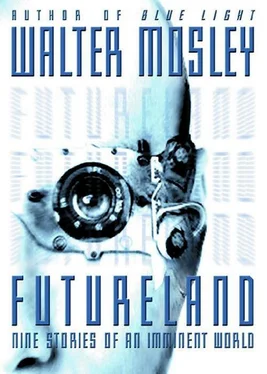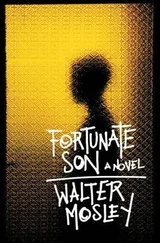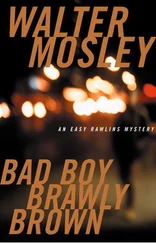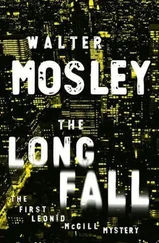“What?” Pell’s confusion showed.
“I mean, you can’t read, can you?”
The wary look of Common Ground came suddenly into the well-spoken young man’s eyes.
“I read. I’ve read the Declaration of Independence, Moby Dick —”
“Without your phono implant?”
Pell tensed for a moment and then let go. He smiled and asked, “What’s the problem, Professor? Why rag on me?”
“Did you know that Homer was an illiterate?”
The question got Pell’s attention.
“Yeah,” Leon continued. “In his time there was no written language, at least not for everyday people like Greek storytellers. A good one like Homer could remember, word for word, a dozen or more epic poems. Poems much longer than most novels you hear today. And he would really act out each part. Deep voice for Zeus and twittery little words for children and animals.
“In Fahrenheit 451 , Bradbury has his ideal community double as a library. Each member commits an important text to memory. It’s called the oral tradition, Pell. Your generation is returning to that. Just like Bradbury’s fireman. Only he still wanted to read.”
“That’s very interesting, Leon—” Pell began. He was going to continue but the professor cut him off.
“So you can see what’s in the cards. The word hear will gain a new significance, while write will fall into disuse. And really, what will writing become when no one can read? And what will the future generations think of writing? Like we think of hieroglyphics, no doubt. And this transition will not take thousands of years, merely decades. Five years without electricity and all of civilization could fall back into barbarism.”
Leon laughed and sat back. It had been years since he befuddled students with his intellectual constructions. Pell was a bright kid, but, the professor thought, he knew nothing and had no idea of the depth of his ignorance.
“So,” Pell paused, making much of his deliberation. “What you’re saying is that you aren’t going senile and Fera can stop worrying about you.”
“That’s one thing,” Leon said, nodding sagely. “Another is that we teeter precariously upon the edge of the precipice.”
It was Pell’s turn to laugh.
“You laugh?”
“I been teeterin’ ever since the first time I was gang raped on the IRT at three in the mornin’.” Pell tapped the branch talisman. “Barbarism done been here, Professor. You could put the rent on that.”
As was often the case, Pell had the last word. That night Leon Jones mulled over and over the crimes committed upon the young man. He’d never heard of the rape. He doubted if Fera knew.
That he survived, Leon wrote in his journal, is a feat greater than all my years of education and Fera’s heavyweight belts rolled up into one.
“Hi, Lenny,” Tracie said in the dream.
Leon was a child too. They were sitting on the ground near a Morningside Park bench. Chamomile was flowering up through the cracks in the asphalt, stingless bees gathered their pollen.
“Do you wanna come on down t’ my house?” Leon wasn’t surprised to hear himself speak in the deep southern accent of his childhood. He was a child after all, playing with his best friend Tracie in the park.
Tracie shook her head vigorously. “I can’t. Not till you go swimming with me.”
“How come?”
“I don’t know,” the blond child said. “But it’s about the park.”
Leon noticed that it was fall. The leaves were turning. They must be maples, he thought, because their leaves are so red. Just then he saw a gang member run from behind one tree, cross the road, and then hide behind another trunk. Another man with a gun followed.
“It’s our park,” Tracie’s voice said.
There came that gurgling scream.
“What’s that?” Leon asked fearfully, but he wasn’t sure if he meant the gang member and robber or the scream.
“That’s just my mom,” Tracie replied. “She’s always screaming like that.”
The dream replayed itself again and again until Leon came to anticipate every event. Sometimes the gang member chased the robber. Sometimes he could make out Tracie’s name in the scream.
“Your daughter called,” Dr. Bel-Nan said the next day at their regular appointment.
“Yeah,” Leon said. “She a good girl.”
He was sitting on a medical table, on waxy paper, in his underwear.
“She’s worried about you.”
“Yeah.”
“Do you know why she’s so worried?” Bel-Nan asked. He was studying an X ray of Leon’s brain on a wall-size passive computer image that appeared as a complex acrylic painting. No light shone from behind the screen, but if Bel-Nan touched any specific point that area was enlarged by ten and overlaid on the broader image.
“No, sir. I don’t.”
Bel-Nan checked image after image, sometimes increasing the subject of his study a thousandfold.
Meanwhile Leon sang, “What you gonna do when the pond goes dry, honey...?”
After fifteen minutes of study and song Bel-Nan turned and asked, “Have you been to the park lately, Professor?”
“I was up there yesterday. Kickin’ back, takin’ it slow.”
“You seem to be speaking in a... a... I don’t know how to say it,” Bel-Nan said.
“Dreamt I was a boy last night,” Leon said with glee. “When I woke up I remembered how I talked back then. They called it ignorant where I went to school so I weaned myself off of it. But you know it kinda tickles me to go back to it a li’l bit. Yeah, just a li’l bit.”
“Is that how you spoke to the little girl, the one you met in the park?”
“Not in the park, no.”
“You saw her somewhere else?”
“In a dream I did. In a dream about the park.”
“What was she wearing?” the doctor asked, seemingly distracted by something he’d seen in the X ray.
But Leon wasn’t fooled. The question was wrong even for a psychiatrist to ask.
“What you lookin’ at, Doc?”
“What? Oh, uh, nothing, really. I mean, I’m looking to see if the microcircuitry has begun to dissolve. You see,” he said, building confidence as he spoke, “the time it takes for the sheath around the circuit to melt away should be enough for the brain to have generated its own neural links.”
Anyone who watched the Med-channel knew about the micro-nerve-bonding process. It involved computer circuitry made from a blood by-product that was compatible with biological processes while temporarily performing complex computer functions. The inventor, Carmine Giampa, was now senior vice president of MacroCode International.
“You don’t say,” Leon said, as if this were the first time he’d heard of such a miracle.
Bel-Nan picked up the sarcasm and cut short his medical lecture.
Leon dressed and went with Bel-Nan to an ultramodern office. All of the furniture was constructed of transparent plasteel accented here and there with the odd stroke of color. It was the kind of furniture that went out of style quickly.
“How long the lease on this furniture you got, Doc?” Leon asked.
“You must tell me about the girl in the park,” Bel-Nan said. His ugly smile was gone, his hair tied back.
“Why? She’s just a child.”
“Did you dream about her before you met her?”
“That would be crazy, now, wouldn’t it?”
“You haven’t answered the question.” Leon could see the doctor’s hands clenched under the transparent desk.
“No. I dreamed about her for the first time last night.”
“Did she seem like a normal child? Was she, how old was she?”
“Twelve. Yeah, just about twelve.”
“But you said that it was a little girl.”
Читать дальше












